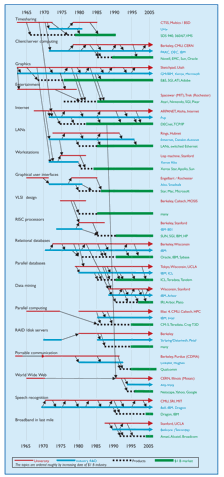SPECIAL FEATURE
Computing Research that Changed the World: Reflections and Perspectives
March 25, 2009 | 8:45 am - 5:00 pm | Members' Room, Thomas Jefferson Building, Library of Congress
Introduction: Changing the World
ED LAZOWSKA, UW
![]() Slides - 992 KB
Slides - 992 KB
![]() Download - 181 MB
Download - 181 MB
![]() Watch the Talk (19:41)
Watch the Talk (19:41)
 Computing has changed the world. Advances in computing have transformed all aspects of our lives: how we conduct commerce, how we learn, our employment, our health care, how we manufacture goods, how government functions, how we preserve our national security, how we communicate, and how we're entertained. Advances in computing have enabled innovation in all other fields. In business, advances in computing are giving researchers powerful new tools, enabling small firms to significantly expand R&D, boosting innovation, and letting organizations manage the existing knowledge of their employees.
Computing has changed the world. Advances in computing have transformed all aspects of our lives: how we conduct commerce, how we learn, our employment, our health care, how we manufacture goods, how government functions, how we preserve our national security, how we communicate, and how we're entertained. Advances in computing have enabled innovation in all other fields. In business, advances in computing are giving researchers powerful new tools, enabling small firms to significantly expand R&D, boosting innovation, and letting organizations manage the existing knowledge of their employees.
In science and engineering, advances in computing are enabling discovery across every discipline - from mapping the human genome to modeling climate change. Advances in computing drive our economy - not just through the growth of the IT industry, but also through productivity gains across the entire economy.
A March 7, 2009, article from the New York Times helps make this case. Faculty members at the Wharton School of the University of Pennsylvania were asked to name the top twenty innovations of the last 30 years - innovations called "life-changers." Nine of the twenty - nearly half - are core computing research advances: the Internet, PC and laptop computers, e-mail, microprocessors, office software, open-source software, e-commerce and auctions, media file compression, and Internet social networking. Computing has made significant contributions to many other innovations on the list, including mobile phones, DNA testing and sequencing, magnetic resonance imaging, and GPS devices. Computing is changing the world and changing our lives.
Imagine spending a day without computing - without information technology. It would be a day without the Internet; a day without diagnostic medical imaging; a day during which automobiles lacked electronic ignition, antilock brakes, and electronic stability control; a day without wireless telephones, high-definition televisions, MP3 audio, DVD video, computer animation, and videogames; a day during which aircraft could not fly, travelers had to navigate without the benefit of GPS, weather forecasters had no models, banks and merchants could not transfer funds electronically, factory automation ceased to function, and the U.S. military lacked technological supremacy. It would be a day that a recent National Academies study referred to as "The Day the Earth Stood Still." Our entire lives function - and function better, usually - because of information technology.
Research has built the foundation for these innovations in information technology, and this symposium highlights much of that research. There has been much work over the past 20 years to understand the IT research ecosystem and its productivity. The consistent conclusion is that every major sector of the IT economy - every billion-dollar subsector - bears the stamp of federal support for research. It's a complex ecosystem, one that the National Academies described as "an extraordinarily productive interplay of federally funded university research, federally and privately funded industrial research, and entrepreneurial companies founded and staffed by people who moved back and forth between universities and industry." But at the core of this ecosystem has been an investment by the federal government in computing research that the President's Information Technology Advisory Committee has concluded yielded "spectacular" return.
While the history of computing's contributions to shaping our world is a compelling topic, future opportunities in computing - where the field might go and what problems it might tackle - are perhaps even more compelling, and are the focus of much of this symposium. Whether it's creating the future of networking, revolutionizing transportation, delivering personalized education, powering the smart grid, empowering the developing world, improving health care, or driving advances in all fields of science and engineering - all national priorities - computing has key contributions to make and key roles to play.
The symposium program is presented in four sessions. In "The Internet and the World Wide Web," we examine how the synthesis of a number of technologies, from scalable systems to search to machine learning, have fundamentally changed the way we organize and access information. In "Computing Foundations," we examine the broad foundations of our field - research not tackling specific societal challenges, but driving forward the base advances in the field in areas like algorithms for distributed systems or machine learning that everyone draws upon to move forward. In "The Transformation of the Sciences via Computation," we examine how using networks of sensors to accumulate vast amounts of data for semiautomatic analysis is revolutionizing the conduct of science yet again. And in "Computing Everywhere," we explore the ubiquitous nature of computing - the fact that 98 percent of processors today are not in things traditionally thought of as computers, but are embedded in a range of devices from environmental sensor networks to entertainment devices to robotics to photography.
The impact of computing research has been extraordinary. The future offers even greater promise.

